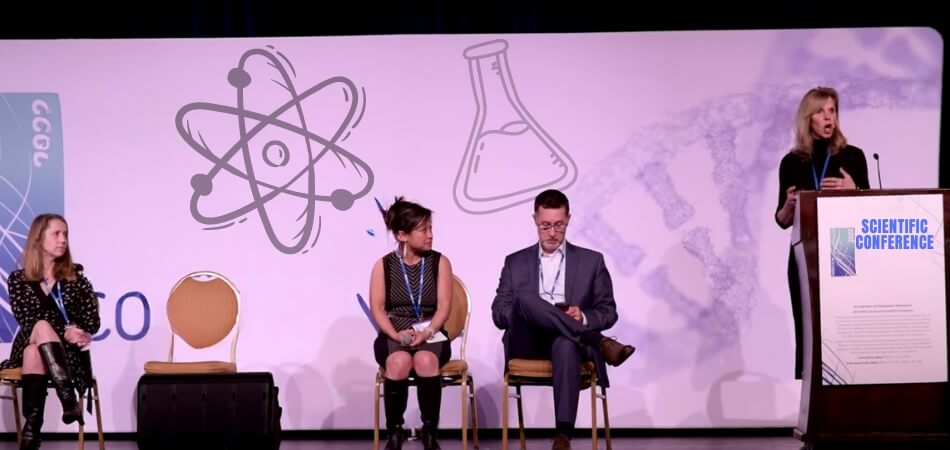Attending a scientific conference is an exciting experience for researchers and academics alike. These events are not just about listening to presentations but offer much more. So, what is the purpose of a scientific conference?
The purpose of a scientific conference is to facilitate the sharing of research findings, encourage intellectual discussions among researchers, and promote collaboration within specific academic disciplines. Scientists exchange ideas, receive constructive feedback, and advance collective knowledge.
Ready to dive more in-depth into the exciting field of scientific conferences? Follow the rest of this article to get a deeper look into the benefits and importance of scientific conferences.
Taking a Brief Look at a Scientific Conference
A scientific conference is a structured event where researchers, scientists, and industry professionals gather to discuss advancements, share findings, and explore future directions in their field. These conferences typically feature keynote speeches from leading experts, multiple sessions presenting recent research, and poster presentations for more interactive discussions.
Attendees of any global scientific conference have the opportunity to network, collaborate on projects, and gain insights into advanced developments. Workshops and panel discussions at scientific conferences provide a platform for deeper dives into specific topics, encouraging ideas exchange and supporting professional growth.
These events are crucial for staying updated with the latest trends, methodologies, and innovations. They also offer a forum for young researchers to present their work and receive feedback from experienced peers. Scientific conferences play a crucial role in advancing knowledge and driving progress in various disciplines.
What is the Purpose of a Scientific Conference?
Scientific conferences are crucial in the academic and research community. They provide a platform for researchers to connect, share ideas, and collaborate. It is essential to understand the purpose of attending international scientific conferences to appreciate their impact. Knowing the purpose will encourage you to attend a scientific conference with career goals.
Facilitating the Sharing of Research Findings
Scientific conferences enable researchers to present their latest findings. This sharing promotes transparency and the dissemination of new knowledge. Presenting research helps scientists gain recognition for their work. It also allows for the critique and improvement of research methodologies.
Encouraging Intellectual Discussions
Conferences nurture intellectual discussions among researchers. These discussions challenge existing ideas and stimulate innovative thinking. Engaging in dialogue helps refine theories and approaches. Researchers benefit from the diverse perspectives and expertise of their peers.
Showcasing Innovations and Technologies
Scientific conferences often feature the latest innovations and technologies in research. Exhibitors showcase cutting-edge tools and techniques that can upgrade scientific work. Attendees can learn about new equipment and methodologies that may benefit their research. This exposure helps researchers stay current with advancements in their fields.
Promoting Collaboration Within Disciplines
Collaboration is encouraged at scientific conferences. They bring together experts with common interests and goals. Networking at these events often leads to joint research projects. Collaboration strengthens research outcomes and broadens the scope of studies.
Providing Constructive Feedback
Constructive feedback is a key benefit of attending scientific conferences. Presenters receive valuable insights from their peers. This feedback helps improve the quality of research and presentations. It also guides researchers in addressing gaps and refining their work.
Advancing Collective Knowledge
Conferences play a crucial role in advancing collective knowledge. They aggregate the latest research from various fields. This collective sharing accelerates scientific progress. Researchers can build on existing knowledge, raising continuous advancements.
Building Professional Networks
Conferences provide an excellent opportunity for building professional networks. Researchers can connect with colleagues, mentors, and industry leaders. Establishing these relationships can lead to future collaborations and career opportunities. A strong professional network can also offer support and resources throughout a researcher’s career.
Why Should You Attend the Scientific Conference?
Researchers and academics benefit greatly from attending scientific conferences. In that case, understanding the value of scientific conferences is essential, as they provide an opportunity to engage with the latest developments in your field and network with peers, which is crucial for your professional growth. Here are several strong reasons why you should consider participating.
Expand Your Knowledge
Scientific conferences are an excellent way to stay updated with the latest research. You will learn about recent advancements and emerging trends. Attending sessions allows you to gain new insights. This knowledge can be applied to your research.
Network with Peers
Conferences provide a unique opportunity to connect with other researchers. You can meet peers, mentors, and potential collaborators. Networking helps you build valuable professional relationships. These connections can lead to future research projects.
Receive Constructive Feedback
Presenting your work at a conference allows you to receive feedback. This feedback is crucial for improving your research. Peers can provide new perspectives and suggestions. Constructive criticism helps refine your methodologies and conclusions.
Discover Funding Opportunities
Many conferences feature sessions on funding and grant opportunities. You can learn about potential sources of research funding. Networking with funding representatives can open doors. This information is invaluable for securing financial support.
Improve Your Career
Presenting at a conference boosts your professional profile. It demonstrates your commitment to your field. Conference participation is often viewed favorably by employers. It can lead to job offers and career advancements.
Gain Inspiration and Motivation
Conferences can be incredibly inspiring. Seeing the work of other researchers can motivate you. You might discover new areas of interest. This inspiration can reinvigorate your passion for your research.
Enjoy Professional Development
Workshops and sessions at conferences often focus on skill development. You can improve your research techniques and presentation skills. These sessions provide practical knowledge. Professional development is a key benefit of attending.
Who Should Attend the Scientific Conference?
Scientific conferences are valuable for various professionals in the academic and research community. These events offer opportunities for learning, networking, and collaboration. Here are six types of attendees who can benefit the most.
- Researchers and Scientists: Researchers and scientists should attend to share their latest findings. These conferences provide a platform for presenting research and gaining feedback.
- Graduate Students: Graduate students benefit from exposure to the latest research. Attending conferences helps them network with established professionals in their field.
- Educators and Professors: Educators and professors can update their knowledge and teaching materials. Conferences offer insights into current trends and developments in their subjects.
- Industry Professionals: Industry professionals gain insights into innovative research and innovations. Attending helps them apply the latest scientific advancements to their work.
- Funding Representatives: Funding representatives attend to identify promising research projects. They can meet potential grant recipients and understand the needs of the research community.
- Policy Makers: Policymakers should attend to stay informed about scientific advancements. This knowledge aids in creating informed policies and regulations.
Attending scientific conferences is crucial for various stakeholders in the research community. Knowing who should attend can create collaboration and knowledge sharing. To assist in your search, consider these steps to find an appropriate scientific conference that aligns with your interests and professional goals.
Tips for Making the Most of Your Scientific Conference Experience
Taking part in a scientific conference is an excellent way to learn new things and network with others. To make the most of your experience, you should be prepared and proactive. Here are some tips to help you maximize your conference participation.
Plan Your Schedule
Review the conference agenda in advance. Identify sessions and workshops that align with your interests. Prioritize events that offer the most value. Planning your schedule ensures you make the most of your time.
Network Actively
Networking is a key benefit of attending conferences. Introduce yourself to other attendees. Participate in discussions and exchange contact information. Building connections can lead to future collaborations.
Engage in Sessions
Attend sessions actively and participate in discussions. Ask questions and share your insights. Engaging in sessions helps deepen your understanding. It also makes you more memorable to speakers and attendees.
Take Notes
The importance of taking notes during a conference cannot be overstated. Write down key points, questions, and ideas. Notes help you remember important details later. They also provide material for future reference and research.
Visit Exhibition Booths
Exhibitors often showcase the latest products and technologies. Spend time visiting exhibition booths. Engage with representatives and ask about their offerings. This can provide valuable insights and resources for your work.
Follow Up Post-Conference
After the conference, follow up with new contacts. Send emails to express your interest in future collaboration. Reflect on what you learned and how it applies to your work. Following up helps solidify relationships and integrate new knowledge.
Stay Open to New Ideas
Be open to exploring new topics and methodologies. Conferences are great for discovering innovative approaches. Staying open-minded can lead to unexpected insights. Embrace the opportunity to expand your horizons.
Frequently Asked Questions (FAQs)
You can greatly benefit from attending a scientific conference if you understand its purpose. Here are some frequently asked questions to help you grasp the significance of these events.
What Are the Main Goals of a Scientific Conference?
The main goals of a scientific conference are to share research findings, encourage intellectual discussions, and promote collaboration within academic disciplines. These goals drive the advancement of collective knowledge.
How Do Scientific Conferences Facilitate Knowledge Sharing?
Scientific conferences provide a platform for researchers to present their latest findings. Presentations and discussions help disseminate new knowledge to a broader audience, promoting transparency and collaboration in the field.
How Do Conferences Promote Collaboration Among Researchers?
Conferences bring together experts with common interests, facilitating networking and collaboration. These interactions often lead to joint research projects and strengthen research outcomes by combining different expertise.
How Do Scientific Conferences Advance Collective Knowledge?
By aggregating the latest research from various fields, scientific conferences advance collective knowledge. Researchers build on this shared knowledge, accelerating scientific progress and nurturing continuous advancements in their disciplines.
What Is the Importance of Networking at Scientific Conferences?
Networking at scientific conferences allows attendees to connect with peers, mentors, and potential collaborators. Building these relationships can lead to future research projects and professional growth opportunities.
Last Words
Scientific conferences offer numerous benefits, including knowledge expansion and networking. The academic and research community needs these events for learning, collaboration, and professional development. By participating, you can gain new insights, receive constructive feedback, and discover funding opportunities.
Knowing “What is the purpose of a scientific conference?” is essential for appreciating its impact. These conferences facilitate research findings sharing, encourage intellectual discussion, and promote collaboration within specific academic disciplines. Attendees benefit from diverse perspectives, improving their research and professional growth.
The importance of scientific conferences in advancing knowledge and raising innovation cannot be overstated. These platforms enable researchers to connect, collaborate, and share ideas. Whether you’re a researcher, student, or industry professional, attending these conferences can enrich your career.








